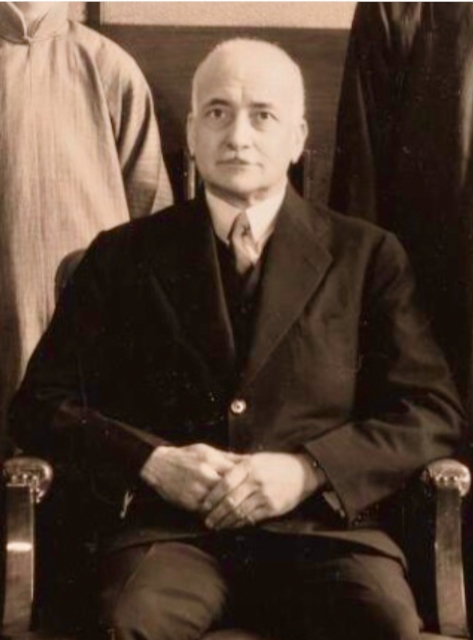Above: Mr Vivian Gordon Bowden 1884-1942
Australian Trade Commissioner, Singapore
Execution of Mr. V.G. Bowden, Australian Trade Commissioner, Muntok, Bangka Island, 17 Feb 1942 – day after Bangka Island Massacre of Australian Nurses at Radij Beach.
Mr Bowden had been appointed in 1937 as Trade Commissioner for Australia in China. Following Japan’s invasion and the upheaval which followed, he was sent to Singapore in the same role.
At Singapore Mr. Bowden had been in communication with the Australian government about departure of embassy staff and himself. On 8 Feb 1942 they (Australian Govt) requested he stay,
We appreciate your difficulties but think you should stick to your post. Otherwise we shall be deprived of independent information and effect on morale would be bad.
On 11 February 1942, Bowden was advised that:
… if the worst comes, you and your staff are to insist on receiving full diplomatic immunities, privileges and courtesies.
The cable also assured him that the Australian Government would insist on:
you and your staff being included in any evacuation scheme agreed on with Japanese Government.
On the evening of 14 Feb, 1942 Bowden with two Embassy staff Quinn and Wootton escaped on a 12 metre launch, called the Mary Rose. Bowden had sent a final message to Australian Government saying he would advise his relocation.On 17 February 1942 the Mary Rose was caught in a searchlight by two Japanese patrol vessels that threatened to open fire. In the absence of a white flag, a pair of underpants was hoisted. The craft was escorted to Muntok harbour, Banka Island in the East Indies.
The prisoners were held in a cinema-hall at Muntok where Bowden informed his captors in their own language of his diplomatic status and remonstrated with guards who attempted to remove his personal possessions. Soldiers punched him and took him outside.
Bowden as a young boy had attended school in Japan and spoke Japanese fluently.
A local resident saw ‘an elderly white-haired gentleman’ forced to dig a shallow grave and stand at its edge before being executed.
He was the only Australian Diplomat to die during WW2. Bowden died on 17 Feb 1942. The day after the Bangka Island Radij Beach massacre.
Please read information from Australian Embassy, Indonesia
Tokyo War Trials
JGG:BEG Report of the Investigating Officer
Capt J.G. Godwin
File 152 Bangka Island Atrocities 17 Feb 1942
‘Former Ldg Pte Tanemura Kiyoshi, 2nd Platoon, 2nd Company, Orita Butai was recalled for reinterrogation regarding the fate of Mr. V. G. Bowden, Australian Trade Commissioner, Malaya, Bangka Island 17 Feb 1942.
Kiyoshi admits his platoon took part in the successful assault on the lightly defended Bangka Island where all Europeans had been captured including a number of Australian nurses. He answered evasively and deviously as he had done in an earlier interrogation by Sgt A.H, Weston.
Kiyoshi pleaded he had not been part of a rifle clubbing incident after the male Europeans had been rounded up. The prisoners had disobeyed orders and punishment was necessary. Kiyoshi pleaded he had been ill with malaria and had not been one of the guards. He had sought permission from his superior officer NCO Furukawa to rest beneath trees in the shade where he dozed off into a deep sleep. When Kiyoshi woke it was early evening, he rejoined his platoon and reported to NCO Furukawa.Kiyoshi admitted he heard screaming coming from nearby houses. Platoon members told him some officers and NCOs were pleasuring (raping) some Australian nurses. He was told after the Officers and NCOs were satisfied it would soon be the platoon’s turn. Kiyoshi then apparently, enquired about the male prisoners and was told they had been beheaded and buried adjacent to a deserted Chinese store.
Kiyoshi was asked if he recalled seeing Mr. Bowden (Australian Trade Commissioner). He responded all Europeans looked the same to him. Kiyoshi was then asked if he knew why the male prisoners had been beheaded, he answered only the officers would know this adding as a lowly soldier he could presume it was punishment for resisting the Imperial Forces of Japan.
Pressed further about the fate of the nurses he volunteered that the following morning after the nurses had been raped incessantly they were herded down to the beach and forced to bathe whereupon a machine gun opened fire and disposed (executed) them. Kiyoshi claimed because of his malaria he did not feel inclined to join the platoon in the rape of the nurses throughout the night. Asked for the names of the Officers and NCOs Kiyoshi hedged around saying it was seven years ago – he could not remember. He did offer that most of the platoon with officers and NCOs were shipped to Rangoon, Burma. Their ship was sunk with great loss of life.
The Japanese authorities had provided corroborative testimony to the investigating officer.
Interrogation of Kiyoshi will continue to determine his own complicity or guilt in the above atrocities which he described as incidents.’

Above: Memorial Bangka Island for Mr. Bowden
Please read Australian Embassy’s words on Mr Bowden’s execution

